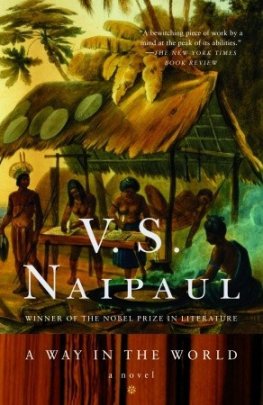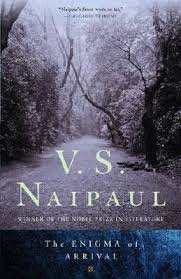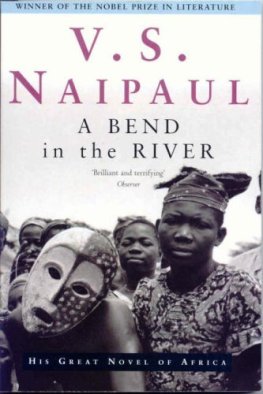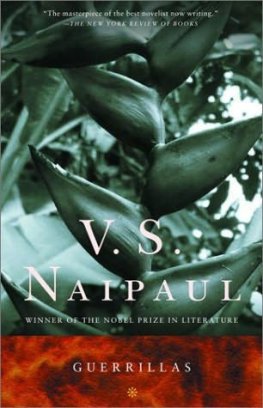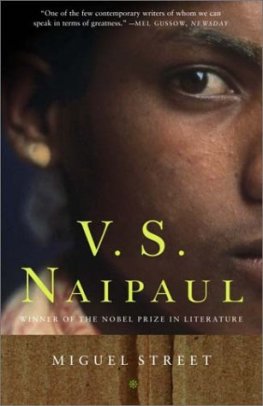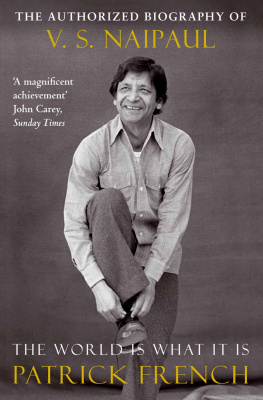V.S. Naipaul
A Way in the World
And year by year our memory fades
From all the circle of the hills.
Till from the garden and the wild
A fresh association blow,
And year by year the landscape grow
Familiar to the strangers child.
1. Prelude: An Inheritance
I LEFT HOME more than forty years ago. I was eighteen. When I went back, after six years and slowly: a two-week journey by steamer everything was strange and not strange: the suddenness of night, the very big leaves of some trees, the shrunken streets, the corrugated-iron roofs. You could walk down a street and hear the American advertising jingles coming out of the Rediffusion sets in all the little open houses. Six years before I had known the jingles the Rediffusion sets played; but these jingles were all new to me and were like somebody elses folksong now.
All the people on the streets were darker than I remembered: Africans, Indians, whites, Portuguese, mixed Chinese. In their houses, though, people didnt look so dark. I suppose that was because on the streets I was more of a looker, half a tourist, and when I went to a house it was to be with people I had known years before. So I saw them more easily.
To go back home was to play with impressions in this way, the way I played with the first pair of glasses I had, looking at a world now sharp and small and not quite real, now standard size and real but blurred; the way I played with my first pair of dark glasses, moving between dazzle and coolness; or the way, on this first return, when I was introduced to air-conditioning, I liked to move from the coolness of an air-conditioned room to the warmth outside, and back again. I was in time, over the years, and over many returns, to get used to what was new; but that shifting about of reality never really stopped. I could call it up whenever I wished. Up to about twenty years ago whenever I went back I could persuade myself from time to time that I was in a half-dream, knowing and not knowing. It was a pleasant feeling; it was a little like the sensations that came to me as a child when, once in the rainy season, I had fever.
It was at a time like that, a time of fever, during a return, that I heard about Leonard Side, a decorator of cakes and arranger of flowers. I heard about him from a school teacher.
The school she taught at was a new one, beyond the suburbs of the town, and in what had been country and plantations right up to the end of the war. The school grounds still looked like a piece of a cleared sugar-cane or coconut estate. There wasnt even a tree. The plain two-storey concrete building green roof, cream-coloured walls stood by itself in the openness and the glare.
The teacher said, The work we were doing in those early days was a little bit like social work, with girls from labouring families. Some of them had brothers or fathers or relations who had gone to jail; they talked about this in the most natural way. One day, at a staff meeting in that very hot school with the glare all around, one of the senior teachers, a Presbyterian Indian lady, suggested that we should have a May Day fair, to introduce the girls to that idea. Everybody agreed, and we decided that the thing to do would be to ask the girls to make flower displays or arrangements, and to give a prize to the girl who did the best display.
If you had a prize you had to have a judge. If you didnt have a good judge the idea wouldnt work. Who was this judge to be? The people we taught were very cynical. They got it from their families. Oh, they were very respectful and so on, but they thought that everybody and everything was crooked, and in their heart of hearts they looked down on the people above them. So we couldnt have a judge from the government or the Education Department or anybody too famous. This didnt leave us with too many names.
One of the junior teachers, very young, a country girl herself, fresh from the GTC, the Government Training College, then said that Leonard Side would make the perfect judge.
Who was Leonard Side?
The girl had to think. Then she said, He work all his life in flowers.
Well. But then somebody else remembered the name. She said Leonard Side gave little courses at the WAA, the Womens Auxiliary Association, and people there liked him. That was the place to find him.
The Womens Auxiliary Association had been founded during the war and was modelled on the WVS in England. They had a building in Parrys Corner, which was in the heart of the city. There was everything in Parrys Corner, a garage for buses, a garage for taxis, a funeral parlour, two cafs, a haberdashery and dry-goods shop, and a number of little houses, some of them offices, some of them dwelling-places; and the well-known Parry family owned it all.
It was easy for me to go to Parrys Corner, and I offered to go and talk to Leonard Side. The WAA was in a very small building from the Spanish time. The flat front wall a thick rubble wall, plastered and painted, with rusticated stone slabs at either end rose up directly from the pavement, so that you stepped from the narrow pavement straight into the front room. The front door was bang in the middle of the pavement wall, and there was a little curtained window on either side. Door and windows had yellow-brown jalousies, linked wooden cross slats you could lift all at once and use an iron pin to close.
A brown woman was sitting at a desk, and on the dusty wall dust catching on the unevenness of the plastered rubble wall were Information Office posters from England. The Tower of London, the English countryside.
I said, They tell me I could find Mr. Side here.
He over there, across the road, the woman at the desk said.
I crossed the road. As always at this time of day, the asphalt was soft and black, as black as the oil-stained concrete floor of the big shed of a garage where the Parry buses were. The building I entered was a modern one, with grey-washed decorated concrete blocks mimicking chipped stone. It was a very clean and plain kind of place, like a doctors office.
I said to the girl sitting at the table, Mr. Side?
She said, Go right in.
I went through to the inner room, and there I could hardly believe what I saw. A dark Indian man was doing things with his fingers to a dead body on a table or slab in front of him. I had gone to Parrys Funeral Parlour. It was a famous place; it advertised every day on the radio with organ music. I suppose Leonard Side was dressing the body. DressingI just knew the word. I had had no idea what it meant. I was too frightened and shocked to say anything. I ran out of the room, and the front room, and got out into the open again. The man ran out after me, calling in a soft voice, Miss, Miss.
And really he was quite a good-looking man, in spite of the hairy fingers I had seen dressing the dead body on the table. He was very pleased to be asked to judge the girls flower competition. He even said he wanted to give the first prize. He said that if we allowed him he would make a special posy. And he did, too. A little posy of pink rosebuds. Our May Day fair was a great success.
A year passed. Fair time came again, and I had to go again and look for Leonard Side. This time I wasnt going to forget: I wasnt going to the funeral parlour. The only place I was going to meet Leonard Side was the Womens Association. I went there late one afternoon after school, about five. The little Spanish-style house was full of women, and in the inside room Leonard Side was doing things with dough, using those hairy fingers to knead dough. Using those fingers to work in a little more milk, then a little more butter.
He was teaching the women how to make bread and cake. After he had finished doing the dough, he began to teach them how to ice a cake, forcing with those hairy fingers coloured icing out of the special cones or moulds he had. He pressed on and then into the moulds with his hairy fingers, and out came a pink or green rosebud or a flower, which he then fixed with icing-flecked fingers on to the soft iced cake. The women said ooh and aah, and he, very happy with his audience and his work, worked on, like a magician.

